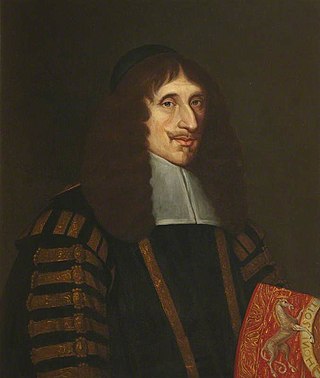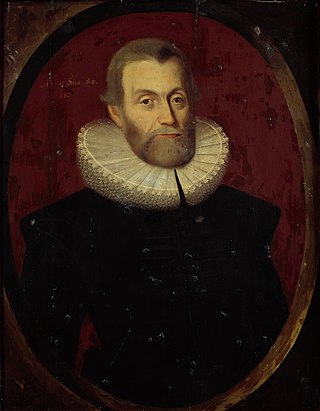Related Research Articles

Sir Arthur Haselrig, 2nd Baronet was a leader of the Parliamentary opposition to Charles I and one of the Five Members whose attempted arrest sparked the 1642–1646 First English Civil War. He held various military and political posts during the 1639–1651 Wars of the Three Kingdoms but became an opponent of Oliver Cromwell during the Protectorate. In 1660, his actions inadvertently helped restore Charles II to the throne; unlike many senior Parliamentary leaders, his life was spared but he was confined to the Tower of London, where he died on 7 January 1661.

John Campbell, 1st Earl of Loudoun was a Scottish politician and Covenanter.

Robert Lilburne (1613–1665) was an English Parliamentarian soldier, the older brother of John Lilburne, the well known Leveller. Unlike his brother, who severed his relationship with Oliver Cromwell, Robert Lilburne remained in the army. He is also classed as a regicide for having been a signatory to the death warrant of King Charles I in 1649. He was forty-seventh of the fifty nine Commissioners.
The Committee of Both Kingdoms,, was a committee set up during the Wars of the Three Kingdoms by the Parliamentarian faction in association with representatives from the Scottish Covenanters, after they made an alliance in late 1643.
Robert Hammond was an officer in the New Model Army under Oliver Cromwell during the First English Civil War and a politician who sat in the House of Commons in 1654. He is best known for his year-long role in keeping Charles I of England in custody.

Sir John Glynne KS was a Welsh lawyer of the Commonwealth and Restoration periods, who rose to become Lord Chief Justice of the Upper Bench, under Oliver Cromwell. He sat in the House of Commons at various times between 1640 and 1660.

John Weaver was an English politician who sat in the House of Commons at various times between 1645 and 1659. He supported the Parliamentarian side in the Civil War
John Clarke, also known as John Clark, John Clerk, and John Clerke, was an English politician and Justice of the Peace who sat in the House of Commons from 1653 through 1660, and was a colonel in the Parliamentary army between 1651 and 1659.

Simon Thelwall (1601–1659) was a Welsh politician who sat in the House of Commons at various times between 1640 and 1654. He fought in the Parliamentary army in the English Civil War.
Richard Price was a Welsh politician who sat in the House of Commons in 1653. He fought in the Parliamentary army in the English Civil War.
Hugh Courtenay was a Welsh politician who sat in the House of Commons in 1653. He was an active parliamentary officer in the English Civil War.

Sir John Carter was an English soldier, politician and administrator from Buckinghamshire, who served in the Parliamentarian army during the Wars of the Three Kingdoms. He settled in Denbighshire and was a Member of Parliament at various times between 1654 and 1660.
Henry Herbert was a Welsh politician who sat in the House of Commons of England between 1642 and 1654. He fought in the Parliamentary army in the English Civil War.

Sir Erasmus Philipps, 3rd Baronet was a Welsh politician who sat in the House of Commons in 1654 and 1659.
Rowland Dawkins was a Welsh military colonel and politician who sat in the House of Commons at various times between 1654 and 1656. He was a zealous supporter of the Commonwealth.
Thomas Madryn was a Welsh politician who sat in the House of Commons in 1654. He fought in the Parliamentary army in the English Civil War.
John James was an English politician who sat in the House of Commons in 1653. He served in the Parliamentary army in the English Civil War.
Edward Elvines was an English politician who sat in the House of Commons in 1654. He supported the Parliamentary cause in the English Civil War.

Hugh Pryce was a Welsh politician who sat in the House of Commons in 1656. He fought in the Parliamentary army in the English Civil War.